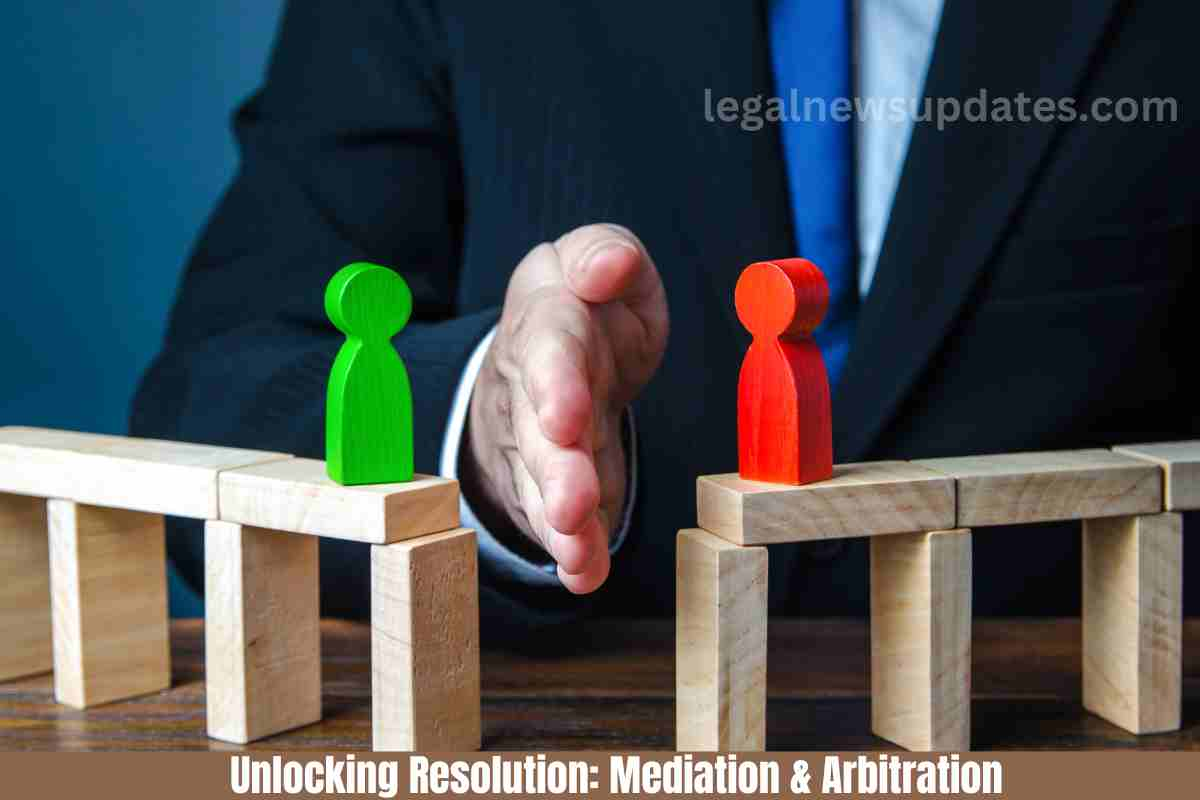Unlocking Resolution: Mediation & Arbitration

Introduction: Unlocking Resolution: Mediation & Arbitration
Unlocking Resolution: Mediation & Arbitration: Mediation and arbitration are two pivotal mechanisms in Alternative Dispute Resolution (ADR). They offer distinct pathways to resolve conflicts outside the conventional courtroom setting. In this comprehensive exploration, we will delve into the nuances of mediation and arbitration, understanding their processes, benefits, and applications.
Understanding Mediation: Collaboration in Conflict Resolution
Mediation is a collaborative forum where disputing parties engage with a neutral third-party mediator to negotiate a mutually acceptable resolution. Unlike adversarial litigation, mediation fosters open dialogue and problem-solving, empowering individuals to voice concerns and explore solutions. It emphasizes compromise and consensus-building, aiming for win-win outcomes.
The Role of the Mediator: Unlocking Resolution: Mediation & Arbitration
The mediator is central to the mediation process, a trained professional who guides discussions, encourages communication and facilitates negotiations. The mediator maintains neutrality, ensuring that all parties are heard and respected. By fostering an environment of trust and understanding, the mediator empowers participants to explore creative solutions and reach agreements tailored to their needs.
Advantages of Mediation: Speed, Affordability, and Privacy
Mediation offers several advantages over traditional litigation:
- It is often faster, with disputes resolved in weeks or months rather than years. This expediency minimizes the emotional and financial burdens associated with prolonged legal battles.
- Mediation tends to be more cost-effective, involving fewer procedural formalities and legal fees.
- Mediation proceedings are confidential, safeguarding the privacy of sensitive matters and preserving relationships.
Situational Suitability: Unlocking Resolution: Mediation & Arbitration
The decision to pursue mediation depends on the nature of the dispute and the parties’ objectives. Mediation is particularly well-suited for conflicts where preserving relationships, maintaining confidentiality, and exploring creative solutions are paramount. It is commonly employed in family, workplace, contractual, and community disputes. By promoting constructive dialogue and collaborative problem-solving, mediation offers a flexible and empowering approach to conflict resolution.
Exploring Arbitration: Adjudication Beyond the Courtroom
Arbitration diverges from mediation by introducing an adjudication element into the dispute resolution process. In arbitration, a neutral arbitrator or panel of arbitrators hears arguments and evidence from both sides and renders a binding decision. While similar to a court trial in some respects, arbitration is typically less formal and more streamlined, offering parties greater flexibility in scheduling and procedural matters.
Arbitrator’s Role: Unlocking Resolution: Mediation & Arbitration
The arbitrator plays a pivotal role in arbitration proceedings, serving as a quasi-judicial figure tasked with impartially evaluating evidence and issuing a final award. Unlike mediators, arbitrators can render legally binding decisions, which parties must abide by. Arbitrators are often experts in their respective fields, possessing specialized knowledge and experience relevant to the dispute.
Benefits of Arbitration: Efficiency, Expertise, and Finality
Arbitration offers several advantages over traditional litigation. It provides parties with a more efficient and expedited resolution process, avoiding delays in congested court dockets. Moreover, arbitrators’ expertise enables them to adjudicate complex matters with precision and insight, ensuring informed decision-making. Additionally, arbitration awards are final and enforceable, providing parties with closure and certainty.
Applicability of Arbitration: Unlocking Resolution: Mediation & Arbitration
Arbitration finds application across a broad spectrum of industries and contexts, ranging from commercial contracts to labour disputes to international trade. Its flexibility and adaptability make it well-suited for resolving complex or cross-border disputes where parties seek a neutral forum and expedited resolution. Arbitration clauses are commonly included in commercial agreements, providing parties with a predetermined mechanism for resolving future conflicts.
Conclusion: Embracing Alternative Paths to Resolution
In conclusion, mediation and arbitration offer invaluable alternatives to traditional litigation, empowering parties to resolve disputes efficiently, collaboratively, and with minimal disruption. While mediation emphasizes dialogue and consensus-building, arbitration blends adjudication with flexibility, catering to diverse needs and circumstances. By embracing these alternative paths to resolution, individuals and organizations can navigate conflicts with clarity, efficiency, and dignity, fostering constructive outcomes and preserving relationships.








1 thought on “Unlocking Resolution: Mediation & Arbitration”